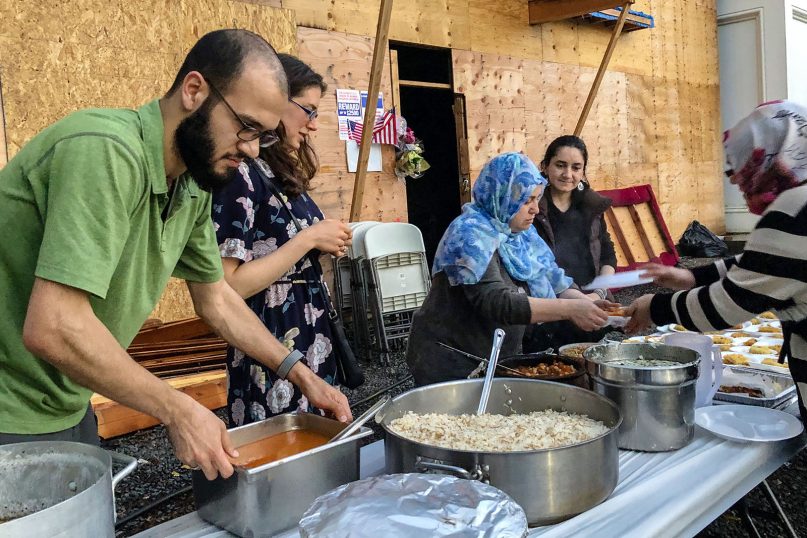NEW HAVEN, Conn. (RNS) — A week after an arson attack left the imposing Diyanet Mosque of New Haven uninhabitable, nearly three dozen members of this Muslim community gathered in front of the building for what should have been a familiar Ramadan ritual — a community iftar, or the breaking of the day’s fast.
Seated around two long rows of folding tables, men, women and children broke their fast with a traditional Turkish meal of bean stew, rice and yogurt.
Their attempt at a return to normal only made many of those who came for iftar more starkly aware of how much has changed.
“I feel like I can’t look behind me,” said Hulya Elevli, 49, facing trailers in the parking lot so as not to look at the damage. “I see the minarets and it’s terrible. They’re right there, right behind me. And we’re out here, outside, instead of inside. I can’t believe this happened to us.”
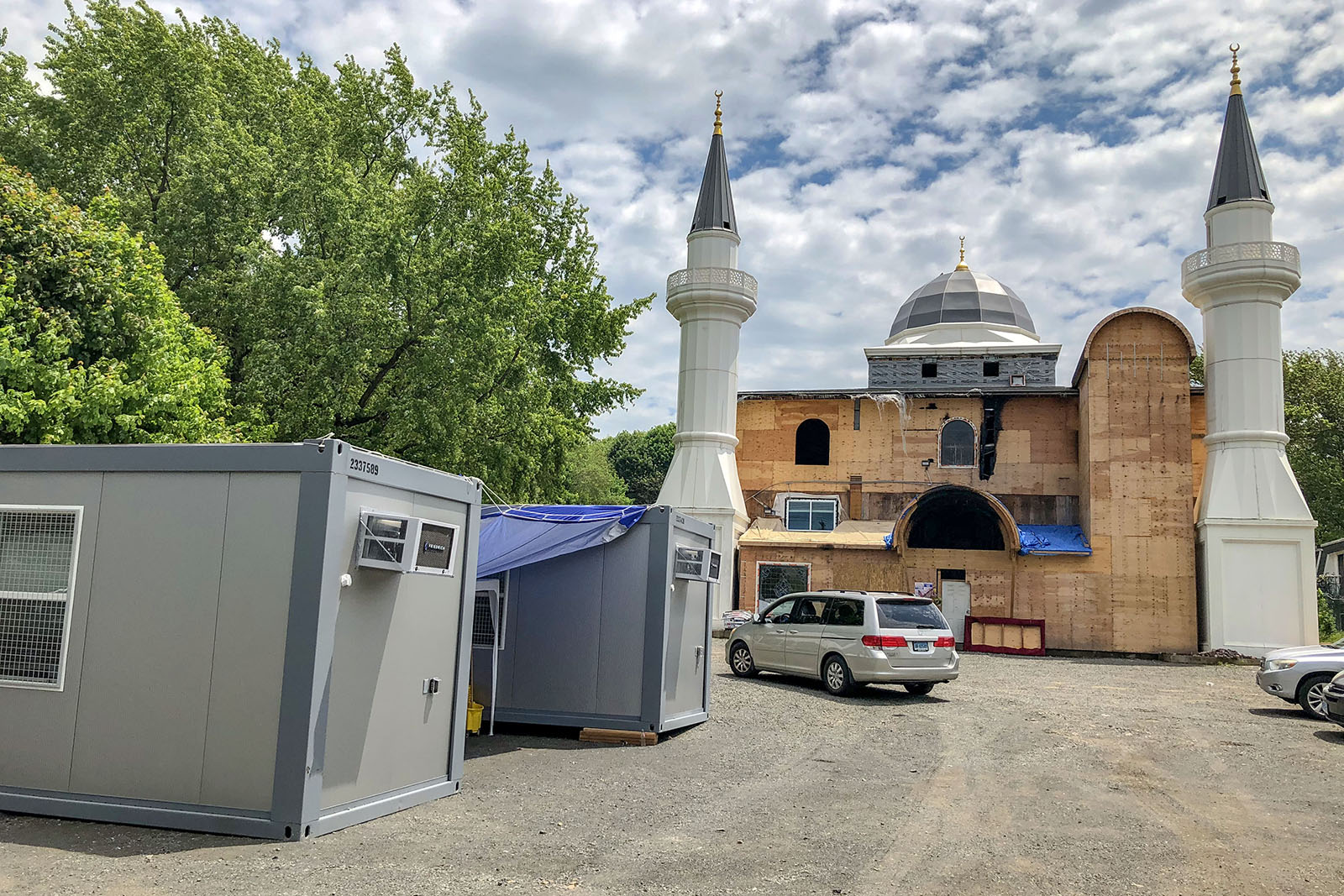
Two rectangular containers erected as temporary prayer spaces sit parked in front of Diyanet Mosque of New Haven, Conn., on May 20, 2019. RNS photo by Rhonda Roumani
The New Haven mosque, one of 30 around the U.S. bearing the name Diyanet, all of which receive funding from the Turkish government, was set ablaze in broad daylight on May 12, destroying much of the ground floor and blackening the front of the building. The following day, New Haven law enforcement officials announced that the fire was the result of arson. The FBI and other federal agencies were called in to conduct their own investigations.
The community here felt its world had been upended.
An outpouring of support from neighbors and other local faith communities has helped soften the shock. Hundreds came to the mosque on Thursday (May 16) for a vigil, and at a Friday news conference called by New Haven Mayor Toni Harp, U.S. Sen. Richard Blumenthal called the attack an “act of terrorism.”
But on Sunday, a week after the blaze, with the cameras and politicians gone, the members of this tightly knit community began to feel the weight of their loss and the enormity of what lies ahead.
“Normally we have 200 people every night at our iftars,” explained Elevli, a teacher at the mosque’s school who said that between listening to Quranic recitations, praying and socializing, members often spent up to eight hours a day in the mosque during the month of Ramadan. “Our people did not come today.”
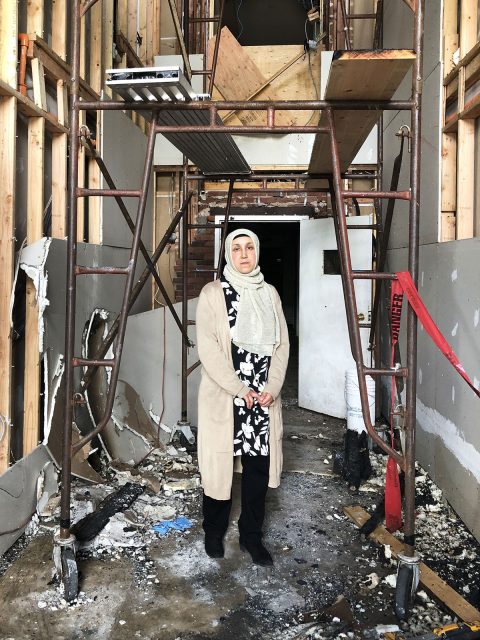
Fazilet Ozkarakoc, a mother of three, spends every evening during the month of Ramadan with her kids at the Diyanet Mosque of New Haven, Conn. “It’s bad,” she said of the fire that heavily damaged it on May 12, 2019. “We’re just finally getting it together. We weren’t even able to talk at the beginning. It’s like your heart aches.” RNS photo by Rhonda Roumani
Irem Uzun, 16, a high school sophomore who has been attending the mosque since she was 6, said the absence of the community during the past week was especially hard. “It didn’t feel like Ramadan anymore. It felt really weird. We’re so used to everyone gathering together every night.”
The building, which the local community purchased in 2009 and has spent a decade converting to a mosque, is the only one in the New Haven area that looks like a classic Middle Eastern mosque, with towering minarets and a large prayer room laid with oriental carpets. The building also has a dining room, numerous classrooms for religious instruction and Turkish language lessons, plus living quarters for the mosque’s imam with room for guests.
A domed prayer area on the third floor with stained glass filtering natural light from above was still a month from being finished when the fire was set. The community’s plan to pray in the space for the first time on Eid, the celebration that ends Ramadan, is now on hold.
The mosque’s architectural formality obscures its familial feel for the mostly immigrant Turks who come to socialize on a daily basis, bringing their kids for weekly classes and even occasional sleepovers. “This house is like one of my children,” said Elevli. “We worked so hard. Step by step, we built every inch of this mosque.”
“It feels terrible. Devastating. Like we lost our second home,” said Fazilet Ozkarakoc, a mother of three who had attended a Quran reading earlier that day. “It’s the holy month of Ramadan. You don’t expect this much evil to happen.”
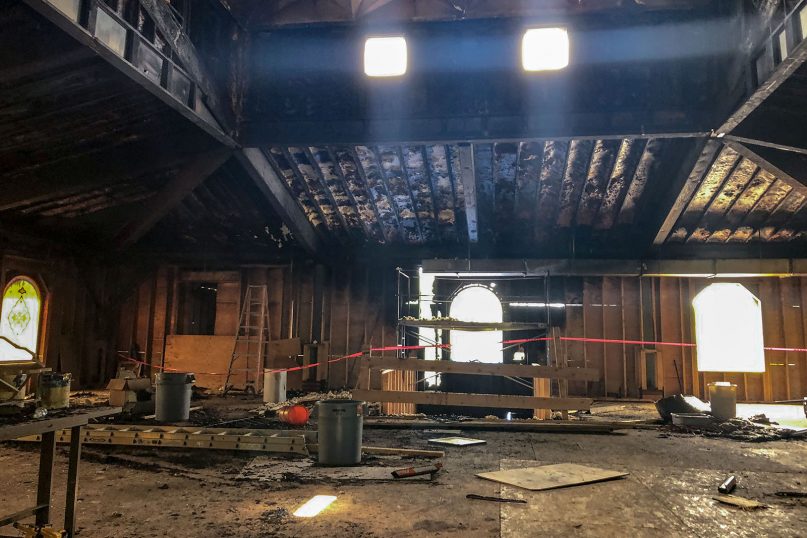
The Diyanet Mosque of New Haven’s third floor, a domed prayer area that had not yet been completed, was destroyed in the fire. Congregants had planned to use the area for Eid prayer at the end of Ramadan. RNS photo by Rhonda Roumani
The attack in New Haven was just one in a rising number of attacks against Muslims — from New Zealand, where 51 people were killed in March in attacks at two mosques in Christchurch, to a mosque in Escondido, Calif., where an arsonist left a letter referring to the Christchurch killings.
In just the past week, a New York man was indicted on hate crime charges after authorities said he trashed a mosque in the Queens borough, while in Virginia, a woman was arrested after allegedly threatening to bomb the Petersburg Muslim Center. In Florida, police arrested a man they said posted threats on Facebook that he would “kill Muslims one by one.”
According to Abbas Barzegar, the national research and advocacy director at the Council on American-Islamic Relations, “anti-Muslim sentiment has been on the rise since the election season of 2015, with a spike in 2017 after the declaration of the Muslim ban,” referring to President Trump’s executive order restricting entry to the U.S. for residents of five Muslim-majority countries.
A report published by CAIR titled “Targeted: 2018 Civil Rights Report” recorded 144 anti-mosque incidents in 2017, of which 57 were labeled hate crimes.
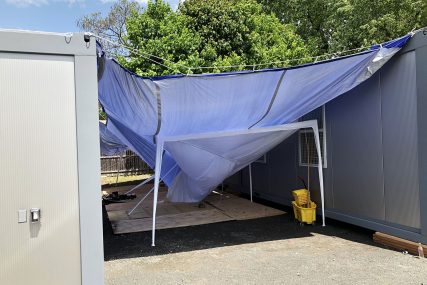
One of two tents erected between two temporary prayer trailers sits fallen outside Diyanet Mosque of New Haven, Conn., on May 20, 2019. The area was intended to be a prayer space for men. RNS photo by Rhonda Roumani
Local leaders in Connecticut have asked for more safety precautions for houses of worship in the state. On Monday, the Bureau of Alcohol, Tobacco, Firearms and Explosives offered a reward of $5,000 for any information leading to the arrest of the Diyanet Mosque arsonist, while CAIR offered a $10,000 reward via Twitter.
Elevli’s husband, Haydar Elevli, is the mosque’s president. He said that with the initial FBI and law enforcement investigations now over, he’s waiting for the insurance inspectors to finish their work so the mosque can begin reconstruction. Three separate online fundraising campaigns have already raised nearly $200,000.
But for the moment, Diyanet’s members are praying on blankets in two long trailers in the mosque’s parking lot. On a recent night, one of two tents pitched to shelter the iftar against rainy weather had collapsed. It was also discovered that the roof of one of the trailers leaked.
“Today was a little frustrating,” said Haydar Elevli, seated across from his wife with his daughter in his lap. “But tonight, it was good. We will get a few more tents and we will keep on going.”
